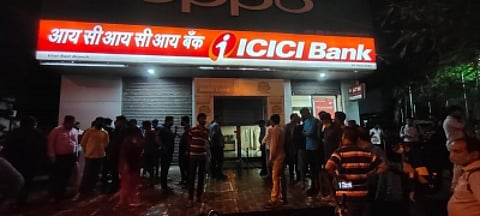

The second largest private sector lender, ICICI Bank has delivered a street-beating set of numbers with net income rising 14.6 percent to Rs 11,059.1 crore for the first June quarter boosted by non-interest income led by treasury gains and dividends from subsidiaries.
The healthy numbers are driven by 7.3 percent higher net interest income that came in at Rs 19,552.9 crore and improved asset quality with the gross non-performing assets coming down to 2.15 percent and net NPAs remaining steady at 0.43 percent compared to 0.42 percent last year.
But the bank management led by the executive director Sandeep Batra and the chief financial officer Anindya Banerjee told reporters Saturday that their provisions for the quarter increased 3.1 percent to Rs 1,332.2 crore driven by some stress in the unsecured and agri books. But on a sequential basis, the provisions surged 85.4 percent.
While the net interest income came in 7.3 percent more at Rs 19,552.9 crore, the net interest margin printed in at 4.36 percent compared to 4.40 percent in Q4FY24 and 4.78 percent in Q1FY24.
Of the total income, non-interest income, excluding treasury, increased by 23.3 percent to Rs 6,389 crore and fee income grew 13.4 percent to Rs 5,490 crore of which fee from retail, rural, business banking and SME customers constituted about 78 percent of total fees in the reporting period.
Treasury chipped in with almost three times more at Rs 613 crore over Rs 252 crore a year ago reflecting realised and mark-to-market gains in equity shares and security receipts. Provisions for securities stood at Rs 1,332 crore compared to Rs 1,292 crore.
Provisions shot up because fresh slippages also more than doubled to Rs 2600 crore from Rs 1200 crore while the NPA additions rose to Rs 5916 crore.
However, Batra was quick to add that “there is no specific sectors to call out now as the stress is mostly due to seasonality. Our personal loan book and credit cards constitute 14 percent of the total retail book and grew by 24 percent this quarter which is a significantly lower pace from the pre-November 2023 period when RBI increased the risk capital ratios drastically."
When asked about the impact of the soon to be implemented new LCR (liquidity coverage ratio) framework, Batra and Banerjee told TNIE that it was too early to assess but there will be some impact. Their present LCR is 123 percent, which is marginally lower than large public sector lenders like PNB which has its LCR at 130 percent.
Deposits grew 15.1 percent to Rs 14,26,150 crore of which average deposits grew 17.8 percent Rs 13,78,658 crore and average current account and savings account ratio was 39.6.
Domestic loans grew 15.9 percent to Rs 11,88,587 crore of which retail loans grew 17.1 percent and comprised 54.4 percent of the total loan portfolio. Including non-fund outstanding, the retail portfolio was 46.3 percent of the total portfolio and the business banking portfolio grew by 35.6 percent.
The SME business, comprising borrowers with a turnover of less than Rs 250 crore grew by 23.5 percent. The rural portfolio grew 16.9 percent and the domestic corporate portfolio grew 10.3 percent, taking the total advances to Rs 12,23,154 crore, up 15.7 percent.
Meanwhile, Batra said the bank infused Rs 500 crore into home finance subsidiary ICICI Home Finance which reported a net profit of Rs 117 crore in the reporting quarter. The bank has till now infused Rs 1,862 crore through equity in the subsidiary.
“In Q1FY25, we did some equity infusion to the tune of about Rs 500 crore into the home finance subsidiary,” he said, adding the bank has so far infused Rs 1,862 crore through equity in the subsidiary.
The home finance arm reported a net of Rs 117 crore from advances of Rs 23,700 crore, jumping from Rs 22,520 crore.